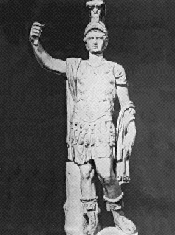Part
2: Alexander the Bringer of Culture
 In
his travels from Macedonia to India, Alexander founded many
cities, several named Alexandria. Most cities were placed on
trade routes, so as to increase the flow of goods between
East and West. The greatest
of these cities,
in Egypt, housed a great library for centuries. All of these
cities were Greek-styled cities in non-Greek territory,
cities in territories that had no real cities. Persian goods
traveled to Athens,
just as Greek goods traveled to Babylon.
Goods and customs mingled, as did soldiers and traders. A
common currency and common language (Greek) united the many
peoples of the empire. All religions were tolerated. People
who had been enemies for centuries were brought together
under a giant umbrella of what historians call
Hellenization&emdash;the spreading of Greek ideals, thought,
and culture to the Middle East and Asia. Alexander also
brought the East back to Greece. A student of
Aristotle,
Alexander had with him botanists, scientists, and
philosophers, all of whom studied and cataloged the plants,
science, and philosophy of the people they conquered. These
observations found their way back to Aristotle, and Greek
knowledge of the East increased.
In
his travels from Macedonia to India, Alexander founded many
cities, several named Alexandria. Most cities were placed on
trade routes, so as to increase the flow of goods between
East and West. The greatest
of these cities,
in Egypt, housed a great library for centuries. All of these
cities were Greek-styled cities in non-Greek territory,
cities in territories that had no real cities. Persian goods
traveled to Athens,
just as Greek goods traveled to Babylon.
Goods and customs mingled, as did soldiers and traders. A
common currency and common language (Greek) united the many
peoples of the empire. All religions were tolerated. People
who had been enemies for centuries were brought together
under a giant umbrella of what historians call
Hellenization&emdash;the spreading of Greek ideals, thought,
and culture to the Middle East and Asia. Alexander also
brought the East back to Greece. A student of
Aristotle,
Alexander had with him botanists, scientists, and
philosophers, all of whom studied and cataloged the plants,
science, and philosophy of the people they conquered. These
observations found their way back to Aristotle, and Greek
knowledge of the East increased.
 This,
then, was the legacy of Alexander the Great: to bring the
West and the East together in a brotherhood of mankind,
peoples of many descents making up one people, speaking a
common language, trading a multitude of goods with a common
currency as a means of exchange, sharing knowledge of math,
science, and medicine–enjoying the world view of a young
man from Macedon who didn't live to see his dream come
true.
This,
then, was the legacy of Alexander the Great: to bring the
West and the East together in a brotherhood of mankind,
peoples of many descents making up one people, speaking a
common language, trading a multitude of goods with a common
currency as a means of exchange, sharing knowledge of math,
science, and medicine–enjoying the world view of a young
man from Macedon who didn't live to see his dream come
true.
First
page > Alexander
the Warrior
> Page 1,
2